人教版(2019)必修第三册Unit 5 The Value of Money Discovering Useful Structures 课件(共18张PPT)
文档属性
| 名称 | 人教版(2019)必修第三册Unit 5 The Value of Money Discovering Useful Structures 课件(共18张PPT) | 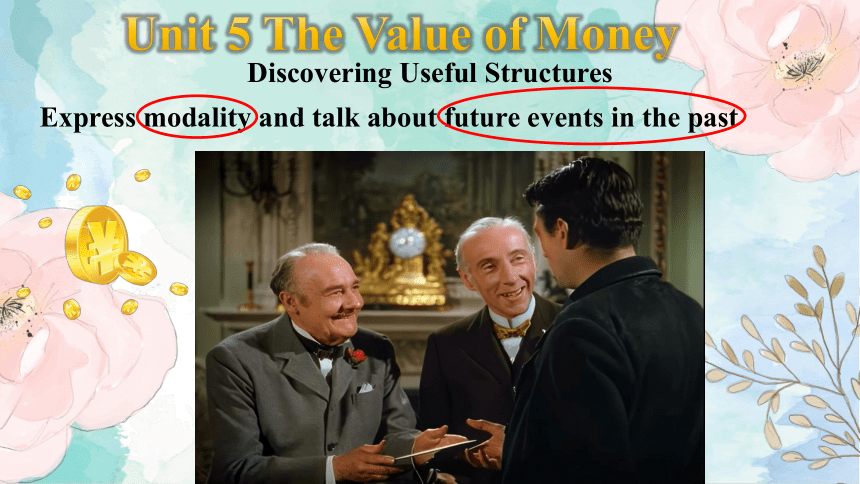 | |
| 格式 | pptx | ||
| 文件大小 | 4.8MB | ||
| 资源类型 | 教案 | ||
| 版本资源 | 人教版(2019) | ||
| 科目 | 英语 | ||
| 更新时间 | 2024-05-02 22:21:53 | ||
图片预览

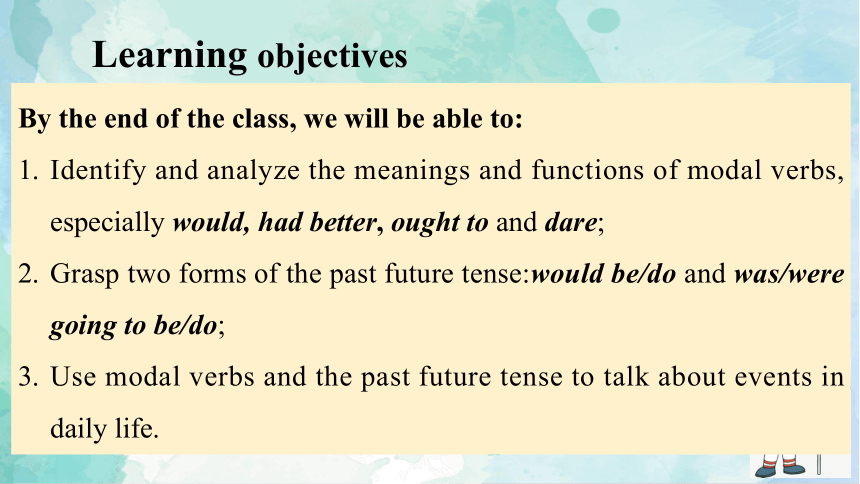
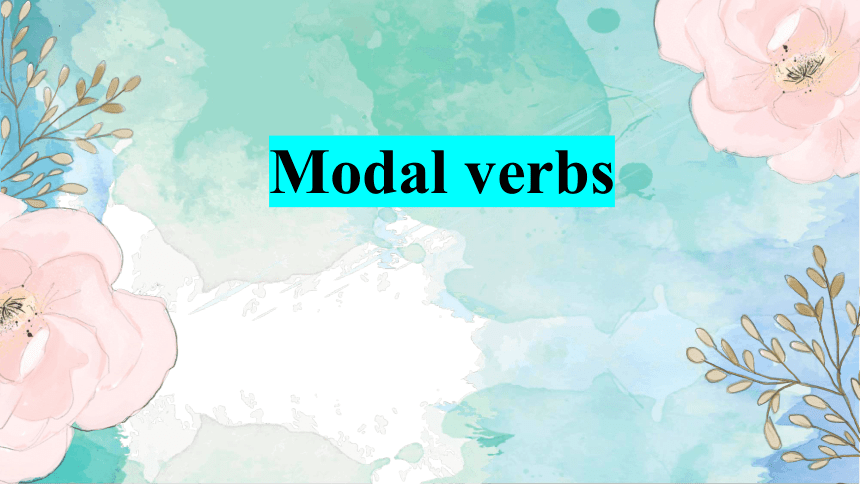
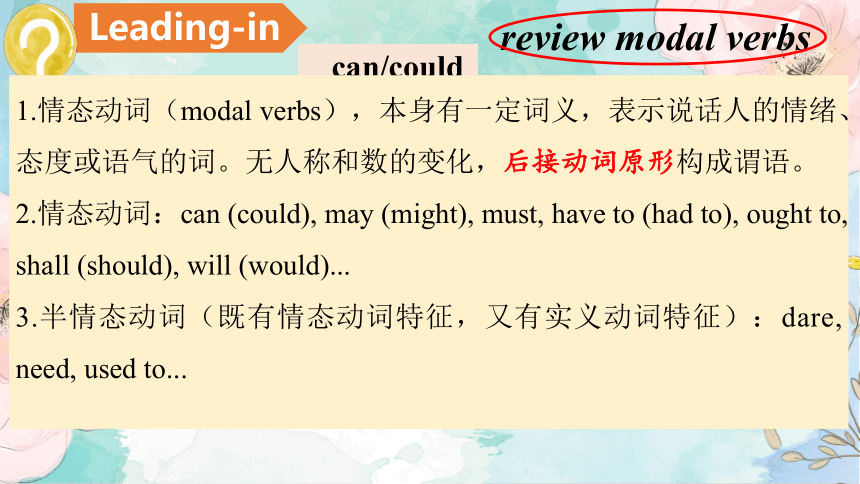
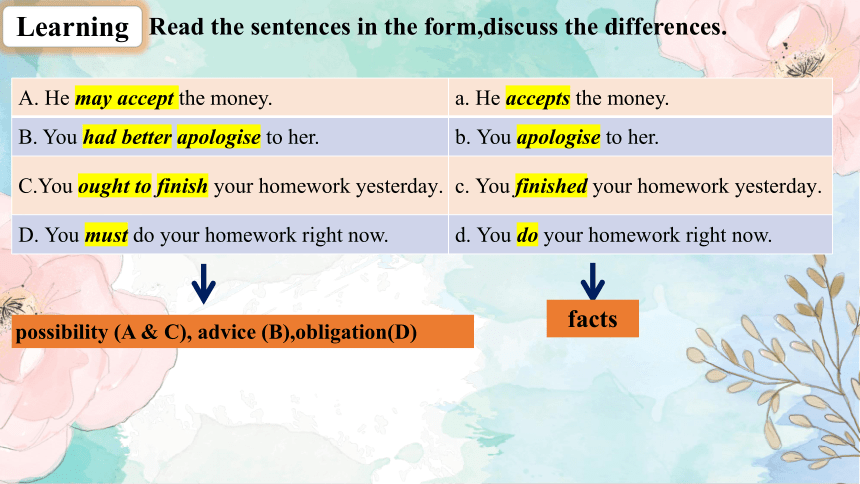
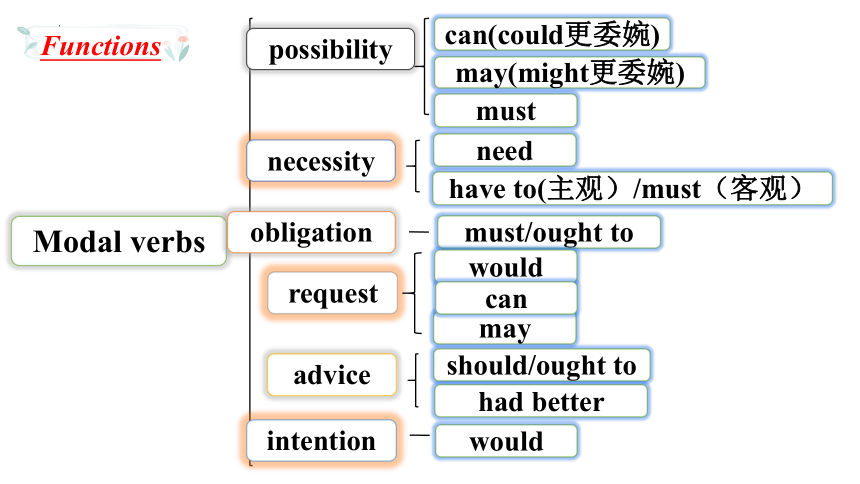
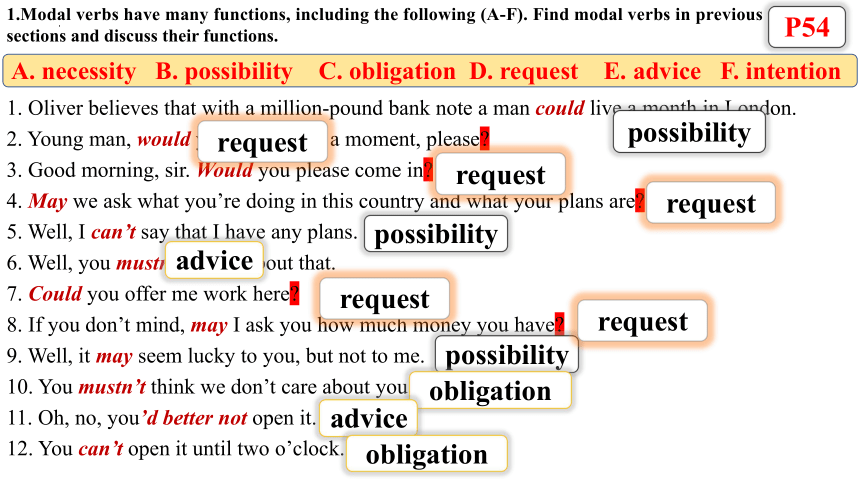
文档简介
(共18张PPT)
Discovering Useful Structures
Unit 5 The Value of Money
Express modality and talk about future events in the past
Learning objectives
By the end of the class, we will be able to:
Identify and analyze the meanings and functions of modal verbs, especially would, had better, ought to and dare;
Grasp two forms of the past future tense:would be/do and was/were going to be/do;
Use modal verbs and the past future tense to talk about events in daily life.
Modal verbs
Modal verbs
can/could
Leading-in
may/might
must
ought to
had better
need
shall/should
dare
will/would
review modal verbs
have to
1.情态动词(modal verbs),本身有一定词义,表示说话人的情绪、态度或语气的词。无人称和数的变化,后接动词原形构成谓语。
2.情态动词:can (could), may (might), must, have to (had to), ought to, shall (should), will (would)...
3.半情态动词(既有情态动词特征,又有实义动词特征):dare, need, used to...
A. He may accept the money. a. He accepts the money.
B. You had better apologise to her. b. You apologise to her.
C.You ought to finish your homework yesterday. c. You finished your homework yesterday.
D. You must do your homework right now. d. You do your homework right now.
Read the sentences in the form,discuss the differences.
facts
possibility (A & C), advice (B),obligation(D)
Learning
Modal verbs
possibility
necessity
obligation
request
advice
intention
can(could更委婉)
may(might更委婉)
need
have to(主观)/must(客观)
must/ought to
would
may
should/ought to
had better
would
must
can
Functions
1.Modal verbs have many functions, including the following (A-F). Find modal verbs in previous sections and discuss their functions.
P54
1. Oliver believes that with a million-pound bank note a man could live a month in London.
2. Young man, would you step inside a moment, please
3. Good morning, sir. Would you please come in
4. May we ask what you’re doing in this country and what your plans are
5. Well, I can’t say that I have any plans.
6. Well, you mustn’t worry about that.
7. Could you offer me work here
8. If you don’t mind, may I ask you how much money you have
9. Well, it may seem lucky to you, but not to me.
10. You mustn’t think we don’t care about you.
11. Oh, no, you’d better not open it.
12. You can’t open it until two o’clock.
A. necessity B. possibility C. obligation D. request E. advice F. intention
possibility
possibility
possibility
request
request
request
request
request
advice
obligation
advice
obligation
It may seem lucky to you but not to me!
You’d better not open it.
You can’t open it until two o’clock.
Would you step inside a moment, please
You mustn’t think we don’t care about you.
Could you offer me work here
They shouldn’t be making a bet on him.
necessity
possibility
obligation
request
advice
intention
Match the sentences with their correct functions.
Practice
2.Read the passage and fill in the blanks with suitable modal verbs in the box.
may must can ought to might had better would should
In the film The Million Pound Bank Note, Henry Adams is stuck in a foreign country without money and friends, and with nowhere to stay. While this situation _____ seem unusual, it can sometimes happen to travellers. In case it happens to you on a trip abroad, what ______ you do First, and most importantly, you _____stay calm. Fear ____ cause you to become confused. You need to think clearly. Second, you should go to your nearest consulate. They ________ be able to help to some extent. Third, you ______ do well to check with some local charities. They ______offer help to travellers in need. Fourth, you _________avoid getting into trouble. You ______ think that stealing some money or food would help you, but you should not do so. Getting caught ______ ruin your life.
may
should
must
can
ought to
would
might
had better
might
would
P54
The Past Future Tense
would be/do 从过去某一时间看将要发生的动作或存在的状态(常用于宾从)
was/were going to be/do...(but...) ①过去的打算;②在过去看来有迹象表明将要发生的动作或存在的状态。但因外界干扰而中断,后常有but出现。
was/were about to do 在过去看来将要发生的动作,不与时间状语连用。
was/were doing come,go,leave,start,arrive...
The Past Future Tense
the day after tomorrow two days later
next week the next week
tomorrow the next/following day
tomorrow evening the next evening
一般将来时 过去将来时
will be/do would be/do
am/is/are going to be/do was/were going to be/do...(but...)
am/is/are about to do was/were about to do
▲
▲
▲
▲
▲
过去的过去
过去
过去的将来
现在
(现在的)将来
had done
did
would do
do
will do
一般将来时和过去将来时的比较
3.Complete the following sentences that describe the future using either form of the given verbs.
1. Philip bought two tickets for The Phantom of the Opera. He __________
___________________ (watch) with his girlfriend on the weekend.
2. I was so surprised at the news that David ___________________________
(play) the role of the dinosaur in the play that I gave him a hug out of joy.
3. Lily decided that she ___________________________ (settle) in New York
and pursue her dream of becoming an actress.
4. Hey, Timmy. I ________________ (call) you. But now that you are here, I
don't have to.
5. The competition was so close that no one was sure who ________________
(win)the Best Actor award.
6. Jim is not here right now. He said he ______________________ (be) on
duty at the library this afternoon.
would watch
/ was going to watch
would play /was going to play
would settle / was going to settle
was going to call
would win
would be/was going to be
Practice
Fill in the blanks with suitable modal verbs in the box. Add not if necessary.Some words can be used more than once.
can’t
could must can ought to had better would
Karen: Oh no! I ______ find the earrings that I’m supposed to wear in the first scene of the play!
Sandy: You mean the silver earrings They _______________ be there beneath your play script. I saw them just now.
Karen: No, they’re not. Someone ______ have taken them!
Sandy: Don’t worry. I can help you look for them if you ______ like me to.
Karen: Oh, that would be great! ___________ you start searching from the other side of the room I’ll start from this
side.
Sandy: Sure, no problem! But what will happen if we _____ find the earrings
Karen: Then I __________ think of a solution quickly! Those earrings are an important part of my costume.
Sandy: Hmm ... Actually you have another option. You ___________ go to the store to buy another pair of earrings that
looks similar to the missing pair. They’re not expensive, right
Karen: That’s a good idea! Thanks, Sandy!
ought to / could
must
would
Could / Can
can’t
had better
could / can
Workbook
P87
Complete the sentences with would, was/were going to, and the words in brackets.
1. The clerk in the consulate told Henry that they ____________________________________
(not, give, a loan).
2. Henry entered the gentlemen’s house, wondering if they _______________________________
(offer, a job).
3. The gentlemen said that Henry ___________________ (know, everything) in an hour and a half.
4. Henry ________________________________________ (explain why, not pay, the bill) right
away when the waiter became impatient.
5. The owner of the tailor’s shop never thought he _______________________ (hold, such a large
note).
6. After one month, Henry went to see the gentlemen with Portia. He _______________________
_____________________ (give back, note).
would not /weren’t going to give him a loan
would / were going to offer him a job
would know everything
was going to explain why he could not pay the bill
would hold such a large note
was going to give the note
back / give back the note
P87
Workbook
Discuss the scene from The Million Pound Bank Note on page 52 with your partners and share your understanding of the story. Use modal verbs when necessary.
Homework
Thanks!
Discovering Useful Structures
Unit 5 The Value of Money
Express modality and talk about future events in the past
Learning objectives
By the end of the class, we will be able to:
Identify and analyze the meanings and functions of modal verbs, especially would, had better, ought to and dare;
Grasp two forms of the past future tense:would be/do and was/were going to be/do;
Use modal verbs and the past future tense to talk about events in daily life.
Modal verbs
Modal verbs
can/could
Leading-in
may/might
must
ought to
had better
need
shall/should
dare
will/would
review modal verbs
have to
1.情态动词(modal verbs),本身有一定词义,表示说话人的情绪、态度或语气的词。无人称和数的变化,后接动词原形构成谓语。
2.情态动词:can (could), may (might), must, have to (had to), ought to, shall (should), will (would)...
3.半情态动词(既有情态动词特征,又有实义动词特征):dare, need, used to...
A. He may accept the money. a. He accepts the money.
B. You had better apologise to her. b. You apologise to her.
C.You ought to finish your homework yesterday. c. You finished your homework yesterday.
D. You must do your homework right now. d. You do your homework right now.
Read the sentences in the form,discuss the differences.
facts
possibility (A & C), advice (B),obligation(D)
Learning
Modal verbs
possibility
necessity
obligation
request
advice
intention
can(could更委婉)
may(might更委婉)
need
have to(主观)/must(客观)
must/ought to
would
may
should/ought to
had better
would
must
can
Functions
1.Modal verbs have many functions, including the following (A-F). Find modal verbs in previous sections and discuss their functions.
P54
1. Oliver believes that with a million-pound bank note a man could live a month in London.
2. Young man, would you step inside a moment, please
3. Good morning, sir. Would you please come in
4. May we ask what you’re doing in this country and what your plans are
5. Well, I can’t say that I have any plans.
6. Well, you mustn’t worry about that.
7. Could you offer me work here
8. If you don’t mind, may I ask you how much money you have
9. Well, it may seem lucky to you, but not to me.
10. You mustn’t think we don’t care about you.
11. Oh, no, you’d better not open it.
12. You can’t open it until two o’clock.
A. necessity B. possibility C. obligation D. request E. advice F. intention
possibility
possibility
possibility
request
request
request
request
request
advice
obligation
advice
obligation
It may seem lucky to you but not to me!
You’d better not open it.
You can’t open it until two o’clock.
Would you step inside a moment, please
You mustn’t think we don’t care about you.
Could you offer me work here
They shouldn’t be making a bet on him.
necessity
possibility
obligation
request
advice
intention
Match the sentences with their correct functions.
Practice
2.Read the passage and fill in the blanks with suitable modal verbs in the box.
may must can ought to might had better would should
In the film The Million Pound Bank Note, Henry Adams is stuck in a foreign country without money and friends, and with nowhere to stay. While this situation _____ seem unusual, it can sometimes happen to travellers. In case it happens to you on a trip abroad, what ______ you do First, and most importantly, you _____stay calm. Fear ____ cause you to become confused. You need to think clearly. Second, you should go to your nearest consulate. They ________ be able to help to some extent. Third, you ______ do well to check with some local charities. They ______offer help to travellers in need. Fourth, you _________avoid getting into trouble. You ______ think that stealing some money or food would help you, but you should not do so. Getting caught ______ ruin your life.
may
should
must
can
ought to
would
might
had better
might
would
P54
The Past Future Tense
would be/do 从过去某一时间看将要发生的动作或存在的状态(常用于宾从)
was/were going to be/do...(but...) ①过去的打算;②在过去看来有迹象表明将要发生的动作或存在的状态。但因外界干扰而中断,后常有but出现。
was/were about to do 在过去看来将要发生的动作,不与时间状语连用。
was/were doing come,go,leave,start,arrive...
The Past Future Tense
the day after tomorrow two days later
next week the next week
tomorrow the next/following day
tomorrow evening the next evening
一般将来时 过去将来时
will be/do would be/do
am/is/are going to be/do was/were going to be/do...(but...)
am/is/are about to do was/were about to do
▲
▲
▲
▲
▲
过去的过去
过去
过去的将来
现在
(现在的)将来
had done
did
would do
do
will do
一般将来时和过去将来时的比较
3.Complete the following sentences that describe the future using either form of the given verbs.
1. Philip bought two tickets for The Phantom of the Opera. He __________
___________________ (watch) with his girlfriend on the weekend.
2. I was so surprised at the news that David ___________________________
(play) the role of the dinosaur in the play that I gave him a hug out of joy.
3. Lily decided that she ___________________________ (settle) in New York
and pursue her dream of becoming an actress.
4. Hey, Timmy. I ________________ (call) you. But now that you are here, I
don't have to.
5. The competition was so close that no one was sure who ________________
(win)the Best Actor award.
6. Jim is not here right now. He said he ______________________ (be) on
duty at the library this afternoon.
would watch
/ was going to watch
would play /was going to play
would settle / was going to settle
was going to call
would win
would be/was going to be
Practice
Fill in the blanks with suitable modal verbs in the box. Add not if necessary.Some words can be used more than once.
can’t
could must can ought to had better would
Karen: Oh no! I ______ find the earrings that I’m supposed to wear in the first scene of the play!
Sandy: You mean the silver earrings They _______________ be there beneath your play script. I saw them just now.
Karen: No, they’re not. Someone ______ have taken them!
Sandy: Don’t worry. I can help you look for them if you ______ like me to.
Karen: Oh, that would be great! ___________ you start searching from the other side of the room I’ll start from this
side.
Sandy: Sure, no problem! But what will happen if we _____ find the earrings
Karen: Then I __________ think of a solution quickly! Those earrings are an important part of my costume.
Sandy: Hmm ... Actually you have another option. You ___________ go to the store to buy another pair of earrings that
looks similar to the missing pair. They’re not expensive, right
Karen: That’s a good idea! Thanks, Sandy!
ought to / could
must
would
Could / Can
can’t
had better
could / can
Workbook
P87
Complete the sentences with would, was/were going to, and the words in brackets.
1. The clerk in the consulate told Henry that they ____________________________________
(not, give, a loan).
2. Henry entered the gentlemen’s house, wondering if they _______________________________
(offer, a job).
3. The gentlemen said that Henry ___________________ (know, everything) in an hour and a half.
4. Henry ________________________________________ (explain why, not pay, the bill) right
away when the waiter became impatient.
5. The owner of the tailor’s shop never thought he _______________________ (hold, such a large
note).
6. After one month, Henry went to see the gentlemen with Portia. He _______________________
_____________________ (give back, note).
would not /weren’t going to give him a loan
would / were going to offer him a job
would know everything
was going to explain why he could not pay the bill
would hold such a large note
was going to give the note
back / give back the note
P87
Workbook
Discuss the scene from The Million Pound Bank Note on page 52 with your partners and share your understanding of the story. Use modal verbs when necessary.
Homework
Thanks!
